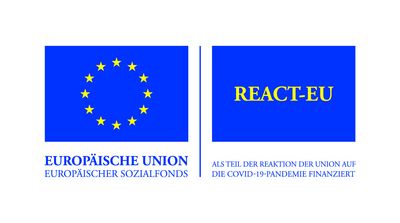New courses on Campus
Free training for small and medium-sized enterprises

Ansbach University of Applied Sciences will expand its continuing education offering with the Smart & Green Academy from 2022. A total of five new courses are offered for free to employees of preferably small and medium-sized enterprises. This is made possible by support from the European Social Fund (ESF). Digital and ecologically sustainable (“green”) skills are taught. Campus Feuchtwangen participates in the following two courses:
Energy consultant course 2. 0
Content: The “Gebäudeenergiegesetz” (GEG) prescribes a reference building procedure to prove compliance with the energy requirements during the construction and renovation of buildings as a basis for calculation. The appropriate energy design of a building is then ideally executed by acknowledged energy efficiency experts. The course should cover relevant energetic-physical, material-specific and building climate relationships for the calculation of energy demand in residential and non-residential buildings. Based on this, essential steps for digitization (3D measurements of existing buildings (with drones if necessary) are created and cross-software exchange of CAD/BIM data) is taught. Furthermore, knowledge of building analysis methods such as unstationary/dynamic calculation methods in the field of humidity and heat is taught. The possibilities of using artificial intelligence to optimize energy demand calculation are examined.
Planned objectives: After the training, participants are able to make a holistic view of buildings and are trained for a targeted and economical use of materials. The handling of the necessary software is shown. As presumably compulsary component of the GEG from 2023/24, the preparation of the ecobalance of a building will be part of the course. In particular, the interaction of the life phases of construction, operation and disposal of a building is addressed.
Energy System Architect course
Content: The energy supply (electricity and heat) in residential and non-residential buildings is currently going through a major change: Not so long ago, the electrician provided the power supply and independently the installer and heating engineer installed the heating system for the building. Nowadays, the requirements are more complex: The power and heat supply should be as efficient and CO2-neutral as possible, smart functions and the connection of all installations to the Internet are a matter of course. With photovoltaics (PV) and storage solutions, every owner becomes a prosumer who no longer only obtains energy from a central power plant, but also supplies it as an active participant in a decentralized network. In order for all these components to develop their full potential, a central authority (interface coordinator) is needed to oversee all technologies and to communicate and translate between the different trades accordingly.
Planned objectives: The contents of the energy system architect are diverse. It teaches the basics of building and energy technology as well as programming and control. The possibilities offered by artificial intelligence (AI) are shown and the processing of recorded measurement data is explained. Participants will be able to assess the diversity of facilities as well as evaluating their suitability and to ensure the necessary networking.
The target groups for both courses are energy consultants, architects and construction managers, but also electricians, installers and heating engineers. The course amounts to 40 lessons of 45min each and is carried out in consultation with the participants, preferably as a presence event at Campus Feuchtwangen or in hybrid or purely digital form.
The courses which are still open to participants as well as further information and registration documents can be found here.
If you are interested in participating, please download the expression of interest here and send it to alexandra.sept@hs-ansbach.de after filling it out.
If you have any questions regarding content, please contact the respective contact person or the Service Center for Research and Transfer for organisational questions:
Dr. Marion Jürgens: 0981 4877 502, marion.juergens(at)hs-ansbach.de
Dr. Alexandra Sept: 0981 4877 318, alexandra.sept(at)hs-ansbach.de
